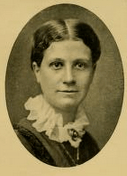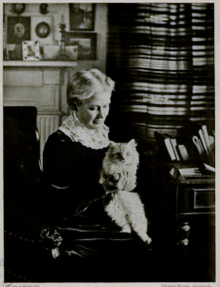Isabella Fyvie Mayo
| Isabella Fyvie Mayo | |
|---|---|
 | |
| Born |
Isabella Fyvie 10 December 1843 London, England |
| Died | 13 May 1914 (aged 70) |
| Pen name | Edward Garrett |
| Occupation | poet, novelist, suffragist, reformer |
| Nationality | Scottish |
| Spouse |
John Ryall Mayo (m. 1870; d. 1877) |
| Relatives | Alexander Hislop, Stephen Hislop |
|
| |
| Signature |
|
Isabella Fyvie Mayo (pen name, Edward Garrett; 10 December 1843 – 13 May 1914) was a Scottish poet, novelist, suffragist, and reformer. With the help of friends, she published poems and stories, using the pseudonym, Edward Garrett. She spent most of her life living in Aberdeen, where she was the first woman elected to a public board.[1] Mayo was described as an "ethical anarchist, pacifist, anti-imperialist and anti-racist campaigner";[2] and her "home was an asylum for Asian Indians."[3]
Early years and education
Isabella Fyvie was born in 1843 in London of Scottish parentage. When a child, her delight was to sit on her father's knee and listen to the legends of Buchan, and the stories that he brought with him from his father's farm, where his ancestors had been settled for three hundred years. His people were staunch Scotch Episcopalians, one of them being the Dean of Moray and Ross. Her mother's ancestors, on the paternal side, belonged to the Border country, and were all of the nonconforming religion, among her near relatives being Rev. Alexander Hislop, Free Church, Arbroath, author of The Two Babylons, and the Rev. Stephen Hislop, missionary and scientist in India; while, on the maternal side, her mother's family belonged to an old Aberdeen family of Established Kirk persuasions.[4]
Younger by many years than the rest of the family, she was educated at a day school, where she took many prizes.[4]
Career
Her first impulse to literary work came from a relative, then a student at King's College London, who saw promise in her school essays and occasional poems, and threw out the suggestion of a literary career. For seven years, she worked without being paid; and it was not till her "Occupations of a Retired Life " appeared in the Sunday Magazine that she felt encouraged to pursue her desire of a literary career. She was only sixteen when she began working to pay off a family debt.[5] It enabled her to make her books helpful to others, and especially to those who were harassed by doubt. At the age of eighteen, she made the acquaintance of Mrs. S. C. Hall, whose encouragement and practical help were of great use to her.[6]
In 1870, she married John Ryall Mayo, a London lawyer,[5] who in 1854, became the first mayor of Yeovil.[7] He was in delicate health, which made travel imperative, and this led to a Canadian tour, followed by residence in Surrey, of which there are glimpses in some of her stories. In 1877, she became a widow, left with one son. In the following year, she left London, which had then grown unendurable to her. At first, she was in danger of lapsing into invalidism, but her health improved after moving to Aberdeen. She is best known by her nom de plume, Edward Garrett, in the pages of the Sunday Magazine, Good Words, The Quiver, Sunday at Home, Girls' Own Paper, Pa Mall Gazette, and others.[6]
Personal life

Mayo favoured women's suffrage.[8] George Ferdinands, a Sri Lankan whom Mayo considered an adopted son, shared her Scottish home till her death.[5] She died on 13 May 1914,[9] of cancer.
Style and themes
Her popular tales and sketches were charming and natural in detail, and showed that her sympathies were wide, while her narratives were drawn with power and accuracy. Her ballads were remarkable for their simplicity and those lightly marked rhymes peculiar to that style of verse. She also took easily to the artificial measures of the sonnet, and all her utterances possessed not only directness of thought, but also depth of imagination and artistic finish.[10]
Selected works
- Occupations of a Retired Life (1868)
- The Crust of the Cake (1869)
- Seen and Heard (1871)
- Premiums paid to Experience (1872)
- Crooked Places (1873)
- By Still Waters (1874)
- Doing and Dreaming (1876)
- Not by Bread Alone (1890)
- Her Day of Service (1892)
- A Black Diamond (1893)
- Rab Bethuene's Double (1894)
- A Daughter of the Klephts (1897)
- A Nine Days Wonder (1898)
- Other People's Stairs (1898)
- Crystal Joyce (1899)
- Recollections of Fifty Years, autobiography (1910)
References
- ↑ Diack 1939, p. 56.
- ↑ BRILL 2014, p. 140.
- ↑ Dray 2007, p. 85.
- 1 2 Edwards 1888, p. 126.
- 1 2 3 Ewan, Innes & Reynolds 2006, p. 262.
- 1 2 Edwards 1888, p. 127.
- ↑ Vickery 1856, p. 17.
- ↑ Pedersen 2017, p. 31.
- ↑ Routledge 1915, p. 347.
- ↑ Edwards 1888, p. 128.
Attribution



Bibliography
- BRILL (29 September 2014). Africa in Scotland, Scotland in Africa: Historical Legacies and Contemporary Hybridities. BRILL. ISBN 978-90-04-27690-1.
- Diack, William (1939). History of the Trades Council and the trade union movement in Aberdeen. Printed for the Trades Council.
- Dray, Philip (18 December 2007). At the Hands of Persons Unknown: The Lynching of Black America. Random House Publishing Group. ISBN 978-0-307-43066-3.
- Ewan, Elizabeth L.; Innes, Sue; Reynolds, Sian (8 March 2006). The Biographical Dictionary of Scottish Women. Edinburgh University Press. ISBN 978-0-7486-2660-1.
- Pedersen, Sarah (3 July 2017). The Scottish Suffragettes and the Press. Palgrave Macmillan UK. ISBN 978-1-137-53834-5.
External links
- Official website
- Works by Isabella Fyvie Mayo at Project Gutenberg
- Works by or about Edward Garrett at Internet Archive
- Works by or about Isabella Fyvie Mayo at Internet Archive
- Isabella Fyvie Mayo, "Edward Garrett" (1843–1914) at the On-line Books site
- Isabella Fyvie Mayo, "Edward Garrett" (1843–1914) at the Wayback Machine (archived 26 October 2009)
- Isabela Fyvie Mayo ("Edward Garrett) biography & selected writings at gerald-massey.org.uk
.jpg)